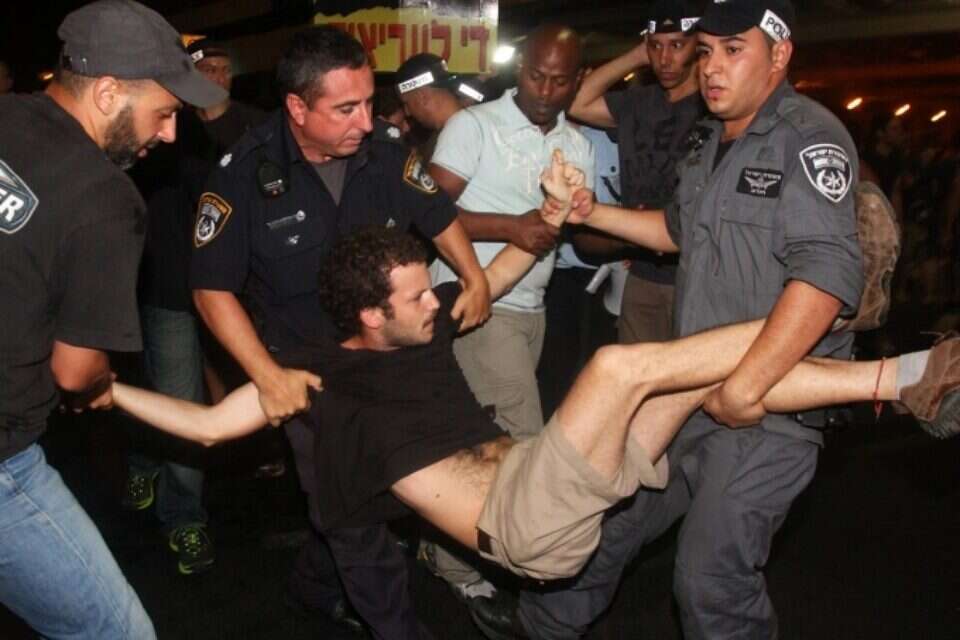In recent months, the National Security Committee has looked like a theater of the absurd. In a series of meetings on police violence against demonstrators, organized by Knesset Member Zvika Fogel, there were all the necessary elements: the use of unreasonable force, the concealment of detainees, blindfolding, false arrests, choking and beatings.
There were also senior police officers, victims of police violence and MKs representing them. Still, something about this show felt a little strange, far from reality. The victims of violence were not the expected actors; They are the ones whom the police are first and foremost meant to protect – body, property and soul.
Mohi Kaplan described to the committee the violent incidents they were involved in, backed up by photos and videos. What they didn't mention was the unprecedented envelope of legal and mental aid they receive free and immediately from the best experts. Putting the issue on the public agenda might have benefited populations exposed to over-policing on a daily basis. But the Kaplan brains, like the Balfour brains, do not fight police brutality. They fight to maintain the selective enforcement of their sector, and expect to receive, as they have, preferential treatment.
Selective enforcement begins with profiling. The Multiculturalism and Gender Clinic at the Hebrew University defined profiling as "attributing dangerousness to a person due to his belonging to a racial, ethnic, national, or religious group, in the absence of concrete information about such dangerousness." That is, the person is suspected, without evidence or reasonable suspicion, only on the basis of his appearance or identity. According to the State Comptroller's report from 2021, which examined police violence against Ethiopian immigrants during the 2019 protests, profiling takes place at all stages of criminal enforcement and in all the bodies involved (police, DIP, courts, etc.). As a result of profiling, the comptroller noted, the rate of detention of Ethiopian minors was 3.3 times higher than their rate in the population.
Profiling is also what characterized the Balfour-Kaplan protests. But not of demonstrators, but of the police officers on the ground. They were automatically identified as Bibists who might take revenge on leftists. During the Balfour era, senior police officials were sent to the studios daily to apologize for the unrestrained behavior of these officers and receive a public reprimand. They absorbed the criticism submissively, until they learned to toe the line with the protesting public. In the time between Balfour and Kaplan, hundreds of police officers resigned, and the police weakened. Police officers were limited in their ability to enforce the protesters, for fear of encountering a high-profile protester. Thus, as in absurdity, as soon as the powerful public violated the order, the police became the ones to be restrained.
Profiling happens all the time. It happens on the street, in the bank, with the lawyer. It also happens in the news, in satire programs, in commercials. However, in the case of most of the Kaplan demonstrators, profiling only benefits them. In court, they will usually be more like judges than police officers, for example. The tables have been reversed, and now the police are the suspects. The judges certainly did not go unnoticed by those videos featuring Mizrahi-looking police officers. They are published on all protest pages, sometimes with their personal details. A Mizrahi policeman holding a demonstrator a professor is, after all, an unthinkable sight. In normal times, the same professor would probably alert the policeman about noise between 2 and 4, but that's a different time. These and other images were etched into the public memory and cemented the use of profiling, which links Mizrahi, Bibism and the urge for revenge.
Law enforcement agencies (including the judicial system) have never been held accountable for the use of profiling against those with an "oriental appearance." To this day, Mizrahim man the prisons in disproportionate numbers, and no one really deals with that. The ongoing denial of the history of violence against Mizrahim was fertile ground for the expansion of profiling and its spillover into other areas of life. This is how the current coalition was framed from day one. Human composition has opened a dam of prejudice, stereotypes and racism, all converging under the definition of profiling.
Wrong? We'll fix it! If you find a mistake in the article, please share with us

